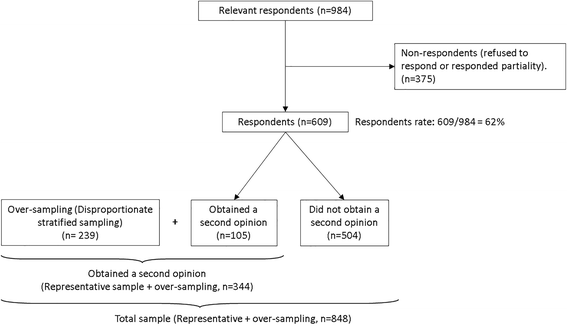Seeking a second medical opinion: composition, reasons and perceived outcomes in Israel
- PMID: 29221461
- PMCID: PMC5721599
- DOI: 10.1186/s13584-017-0191-y
Seeking a second medical opinion: composition, reasons and perceived outcomes in Israel
Abstract
Background: Seeking a second-opinion (SO) is a common clinical practice that can optimize treatment and reduce unnecessary procedures and risks. We aim to characterize the composition of the population of SO seekers, their reasons for seeking a SO and choosing a specific physician, and their perceived outcomes following the SO.
Methods: A cross-sectional national telephone survey, using a representative sample of the general Israeli population (n = 848, response rate = 62%). SO utilization was defined as seeking an additional clinical opinion from a specialist within the same specialty, for the same medical concern. We describe the characteristics of respondents who obtained SOs, their reasons for doing so and their perceived outcomes: (1) Satisfaction with the SO; (2) Experiencing health improvement after receiving a SO; (3) A difference in the diagnosis or treatment suggested in the first opinions and the second opinions; (4) Preference of the SO over the first one.
Results: Most of the respondents who sought a SO (n = 344) were above 60 years old, secular, living with a partner, perceived their income to be above average and their health status to be not so good. For the patients who utilized SOs, orthopedic surgeons were sought out more than any other medical professional.Reasons for seeking a SO included doubts about diagnosis or treatment (38%), search for a sub-specialty expert (19%) and dissatisfaction with communication (19%). SO seekers most frequently chose a specific specialist based on a recommendation from a friend or a relative (33%). About half of the SO seekers also searched for information on the internet. Most of the respondents who sought a SO mentioned that they were satisfied with it (84%), felt health improvement (77%), mentioned that there was a difference between the diagnosis or treatment between the first opinion and the SO (56%) and preferred the SO over the first one (91%).
Conclusions: Clinical uncertainty or dissatisfaction with patient-physician communication were the main reasons for seeking a SO. Policy makers should be aware that many patients choose a physician for a SO based on recommendations made outside the medical system. We recommend creating mechanisms that help patients in the complicated process of seeking a SO, suggest specialists who are suitable for the specific medical problem of the patient, and provide tools to reconcile discrepant opinions.
Keywords: Health policy; Health seeking behaviors; Patient-physician communication; Second opinion; Survey.
Conflict of interest statement
Authors’ information
Liora Shmueli, has completed her PhD at the Department of Health Systems Management, at Ben-Gurion University of the Negev. Geva Greenfield, PhD, is currently a Research Fellow in Public Health at the Department of Primary Care and Public Health, School of Public Health, Imperial College London.
Joseph S. Pliskin, PhD, is Professor Emeritus at Ben-Gurion University of the Negev. He is a member of the Department of Industrial Engineering and Management and of the Department of Health Systems Management. Prof. Pliskin is also an Adjunct Professor of Health Policy and Management at the Harvard T. H. Chan School of Public Health.
Ran Balicer is an Associate Professor at the Department of Public Health at Ben-Gurion University of the Negev and Secretary of the Israel Public Health Physician Association. He serves as the director of the Clalit Research Institute and of the Health Policy Planning Department, Chief Physician’s Office, Clalit Health Services.
Igal Hekselman, MD, MHA, is a family physician. He serves as a medical Director of Health Insurance System & Clalit Mushlam at Clalit Health Services, Israel.
Nadav Davidovitch, MD, PhD, is an epidemiologist and public health physician. He is Professor and Director, School of Public Health, Faculty of Health Sciences, Ben-Gurion University of the Negev. His current research deals with health policy, health inequities, health and Immigration, vaccination policy, environmental health, and public health ethics.
Ethics approval and consent to participate
The protocol was approved by the sub Institutional Helsinki committee at “MEIR” Medical Center, NO ק2010/ 137.
Consent for publication
Not applicable.
Competing interests
The authors declare that they have no competing interests.
Publisher’s Note
Springer Nature remains neutral with regard to jurisdictional claims in published maps and institutional affiliations.
Comment in
-
Obtaining a second opinion is a neglected source of health care inequalities.Isr J Health Policy Res. 2019 Jan 16;8(1):12. doi: 10.1186/s13584-019-0289-5. Isr J Health Policy Res. 2019. PMID: 30651143 Free PMC article.
References
MeSH terms
Grants and funding
LinkOut - more resources
Full Text Sources
Other Literature Sources


